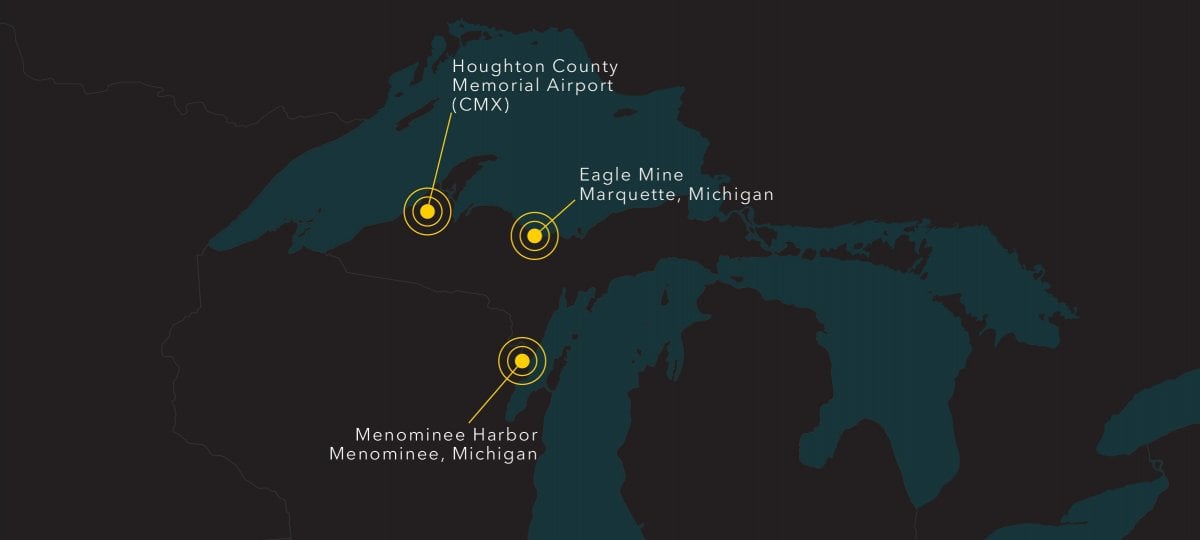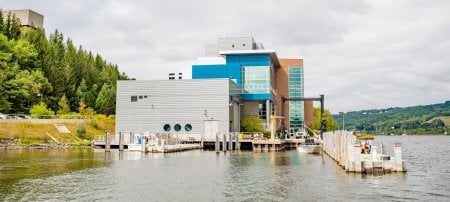Over time, natural fluctuations and declining lake levels have caused the waters in Menominee Harbor to become shallower.
Located on the border between Michigan's Upper Peninsula and Wisconsin, the harbor lies between the cities of Menominee, Michigan, and Marinette, Wisconsin. In a harbor that federal officials have referred to as an economic engine, every inch of water depth that is lost has a direct impact on shipping traffic and the industries based there. When shipping traffic can't get in or out of the harbor, millions of dollars and local livelihoods are at stake.
To safely navigate the harbor without running aground, vessels can't be fully loaded. That results in greater transportation costs for shippers and presents economic challenges for the Upper Peninsula and northeast Wisconsin.
Working with the United States Army Corps of Engineers, the City of Menominee is conducting an approximately $2.6 million feasibility study to evaluate the logistics of dredging the harbor to a more navigable depth that will allow existing and potential new businesses to prosper in the port. To aid in this appraisal, the city engaged Michigan Tech College of Business faculty members Laura Connolly and Jenny Apriesnig, along with research scientist Travis White of Tech's Great Lakes Research Center.
The Michigan Tech research team was tasked with determining the range of economic impacts related to increasing the depth of the harbor. The results of their study highlight both the potentially significant economic gains in the region if the Menominee Harbor is deepened and considerable potential losses if the status quo is maintained.
Connolly, Apriesnig, and White used a boots-on-the-ground approach to conduct their evaluation, starting with a series of onsite meetings with local businesses and government agencies.
"When we're having these conversations, we're trying to grasp each stakeholder's sense of what will happen given the expected change," says Apriesnig. "For the study, we make assumptions in terms of what economic variables might change, in what industry, and by what magnitude. The interviews help us come up with the economic scenarios needed to do the predictive analyses."
There are many variables that can affect the project. Researchers take that into consideration.
"The predictions are uncertain by nature, so we do a spectrum of scenarios from the most pessimistic to most optimistic. We're not locking into a particular outcome, but we're showing the range," says Connolly.
Once the scenarios were developed, the researchers devised the best way to implement the analysis. The team used IMPLAN, an input-output modeling platform that estimates direct, indirect, and induced effects, and accounts for the interdependence across industries using statistical data from the US Bureau of Labor Statistics, the US Bureau of Economic Analysis, and the US Census Bureau.
"Laura and Jenny were very friendly, outgoing, and hardworking. Their professionalism and dedication were second to none," says Brett Botbyl, Menominee city manager. "I really appreciated their attention to detail with the task at hand."
Researchers recruited a six-member team of College of Business students to assist them. "Economic impact studies are pretty approachable, compared to some other methods that we use," says Apriesnig. "Because of that, we were able to incorporate several students into the Menominee study. It gave them opportunities to do a lot of data visualization."
For some Huskies, the study was an inspiring first exposure to research. "It sparked an interest to consider grad school and become more formally trained in research techniques and methods. It was a nice spillover effect," says Connolly.
Senior finance and economics major Sydney Lurvey '25, worked on creating infographics and data modeling in her role as a research assistant. "It was a really cool experience to be part of this project and work so closely with two professors at Michigan Tech," she says.
"The experience gave me a good insight on what economics in the real world can look like."
For finance major Marguerite Goldman '26, the project deepened her love for research. With the confidence she gained, she applied for and was awarded an MTU Undergraduate Research Internship Program grant to investigate how community resources can help students overcome challenges, achieve their goals, and make a positive impact in the community.
Building a Tradition of Helping Communities
Connolly and Apriesnig, along with Emanuel Xavier-Oliveira, associate professor of economics, have been involved in additional economic impact studies in recent years.
Their first, a report investigating the impact of the eventual closing of the Eagle Mine in Marquette County, was completed in late 2022. The report sought to quantify the economic and social impacts of Eagle Mine to date and project the economic impacts of closure in 2026.
They also evaluated the economic impact of a change in Houghton County Memorial Airport (CMX) air service. The study found that the elimination or reduction in passenger air service at CMX would hinder Houghton County's future economic growth, while enhanced air service would boost it, especially over the long term.
And, they studied the impact of Michigan Tech research expenditures on Houghton County and conducted a similar study in Washtenaw County, where the Ann Arbor-based Michigan Tech Research Institute is located. The study found that across both counties, the University's externally sponsored research expenditures are associated with cumulative economic impacts of approximately $1.13 billion in output, $108 million in tax revenue, and 500 jobs per year.
"These studies help connect us to the local community," says Connolly. "We've had so many interesting conversations that I wouldn't have had otherwise. It's great to work on something that is important to our region."
Apriesnig and Connolly are members of the Center for Economic and Business Analytics, a research group that explores synergies between the College of Business and the College of Computing to improve Michigan Tech's response to business, academic, and societal challenges and opportunities.
Michigan Technological University is an R1 public research university founded in 1885 in Houghton, and is home to nearly 7,500 students from more than 60 countries around the world. Consistently ranked among the best universities in the country for return on investment, Michigan's flagship technological university offers more than 185 undergraduate and graduate degree programs in science and technology, engineering, computing, forestry, business, health professions, humanities, mathematics, social sciences, and the arts. The rural campus is situated just miles from Lake Superior in Michigan's Upper Peninsula, offering year-round opportunities for outdoor adventure.





